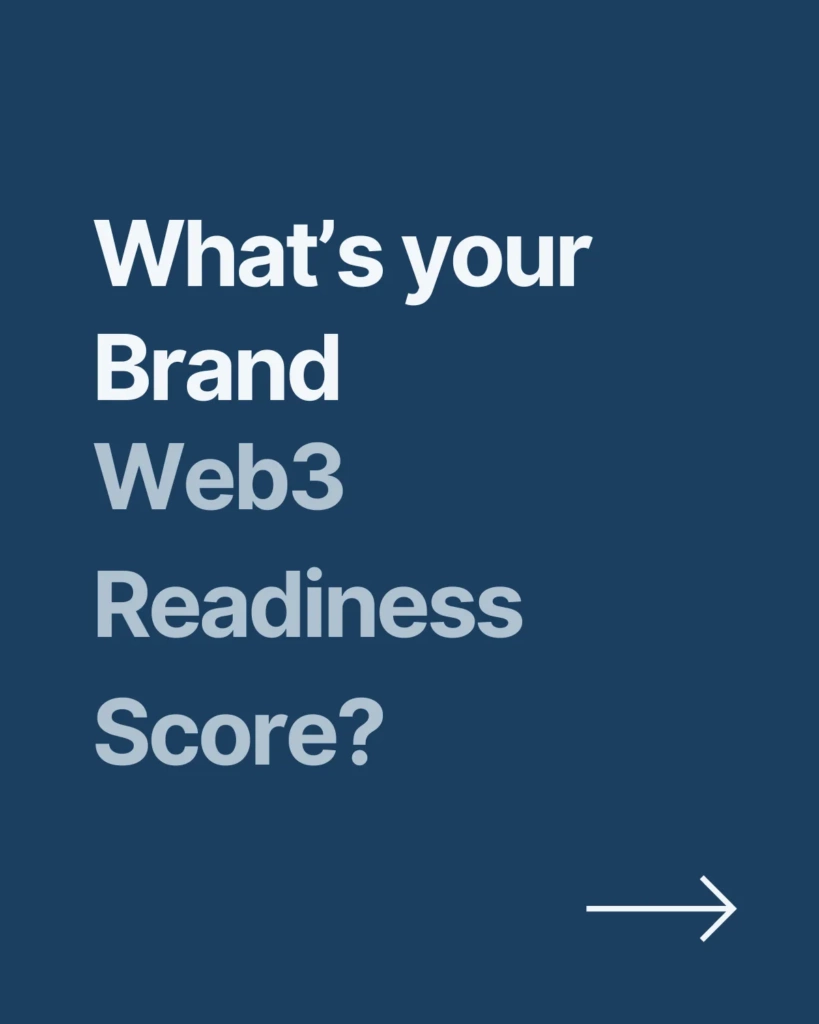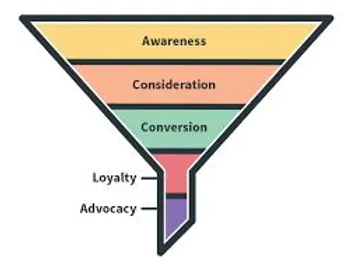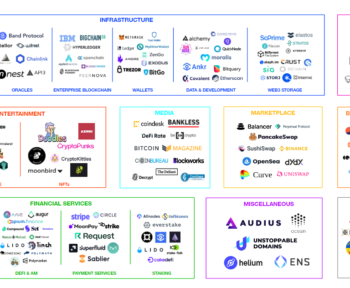
The crypto winter is still going on, the popularity of NFTs is at an all-time low, but make no mistake, it is the entire economy that is lagging behind.
However, the groundwork is underway to make Web3 the new playground for brands. Brands must prepare for it, after having successfully completed your digital transformation, is your brand really ready to become a “Web3 Brand”? What about the Companies and Organizations that manage them?
Our discussions with brand managers in many sectors, from luxury to retail, automotive, sport and even leisure industries confirm it: we are entering a phase of consolidation and rationalization of practices that are capable of enabling Web3 brands to eventually reach their full maturity.
Other brands question themselves, want to understand, observe, and wish to benchmark practices to set a roadmap for Web3.
Our research focuses on the development of a Web3 Maturity Index for Brands.
We initially set the directions for brands with a “Web3 Readiness Score”, which measures the degree of preparation of an organization to deploy brands in Web3.
Secondly, and following the deployment of their first Web3 initiatives, brands will then be able to measure their performance and benchmark their development with a Web3 Maturity Index.
Firs things first, let’s look at the “Web3 Readiness Score” to structure and manage the development of companies and their brands.
The objective here is to structure and benchmark practices, measure “gaps” and set priorities.
Our experience shows that there are a few organizations that have structured themselves, are moving forward, internally or by setting up Joint Ventures, or both. Other organizations, many more, are undoubtedly a little ” disoriented” … do not know where to look, how to benchmark practices, to gradually begin their” Web3 transformation”.

Academic research, discussions, interviews, trade shows, AI, R&D allow us to define the 10 dimensions, the 10 questions that define brand’s readiness to enter Web3. The result, a “Web3 Readiness Score” ranging from 1 to 100.
The 10 Questions Check List to measure your Brand Web3 Readiness Score
Below are the 10 dimensions, the 10 questions that define brands’ Web3 Readiness.
- Management support? This is a crucial factor in determining the readiness of a brand and more generally the readiness of an organization for web3. Support and understanding of web3 from management and board members are essential for a successful implementation. The most successful projects are those that are clearly supported by management. For example, Kering, the luxury house moved in, early on, with dedicated team of people for Web3 and metaverse. According to François Henri Pinault, the CEO, the objective is clearly to set the stage, “test and learn” and explore new opportunities of business for brands (Gucci is of Kering brands). Other organizations such as Nike, Adidas, moved in early on as well with dedicated teams to support initatives and drive business forward.
- Dedicated Web3 Team? Having a dedicated team within the organization that focuses on web3 technologies and related marketing strategies is a strong indicator of “readiness”. This team should ideally include members with diverse backgrounds ranging from technology (blockchain, tokens, smart contracts, etc.), legal, finance (cyrpto, DEFI), and marketing.
- Web3 education and training? The level of knowledge and understanding of web3 throughout the organization is another important factor. This can be assessed by the presence of internal training programs, workshops or academies focused on web3 technologies and their implications for the business. The LVMH group is an other example of a giant organization that drives internal education to web3 opportunities with a formal training and education program for all. In France, the Casino group, a leading retailer, set up their internal Web3 Academy to train staff across all functions.
- Legal and regulatory compliance? Understanding and complying with legal and regulatory aspects of web3 is crucial. This includes knowledge of data protection laws, smart contract legalities, and cryptocurrency regulation.
- Financial readiness? The financial preparation of the brand to invest in web3 technologies and strategies are another important factor.
- Technical infrastructure? The brand’s existing technical infrastructure and its ability to integrate with web3 technologies is critical.
- Customer Engagement? The brand’s ability to engage with customers in a web3 environment is important. This can be assessed by examining existing marketing strategies and their adaptability to web3 requirements.
- Brand Alignement with Web3 values? The brand’s values and mission must align with web3 principles, such as decentralization, transparency and sharing value with users and customers. This dimension again, is among the most important ones. Clearly some brands have better abilities to aligne with web3 principles.
- Culture of Innovation? A culture that encourages innovation and experimentation can significantly help a brand and more generally a business move to web3.
- Partnerships and Collaborations? The brand’s existing partnerships and collaborations in the web3 space may also indicate a certain level of preparation and commitment. This may refer to partnerships with blockchains, participation in web3 consortia or even collaborations with other brands or players in the web3 space.
These 10 questions provide a comprehensive assessment of a company’s, or brand’s, readiness for Web3. From this evaluation, we compute a “Web3 Readiness Score” varying from 1 to 100. Each brand is then compared to the overall and/or category benchmark.
Clearly, some sectors are more ready than others. The luxury industry, for example, is an early adopter and set the stage on many aspects of web3 readiness. Other sectors and web3 native brands are also interesting to study to set your directions and priorities.

Key Results and Perspectives
We nearly scored 100 brands so far. Findings are interesting and provide key learnings. Below are just a few highlights.
Among the brands most “ready” for Web3, we of course find most luxury brands. Indeed, the benefits of security, authenticity, and even exclusivity associated with blockchain largely led luxury players to move in very early on. Gucci, with a Score of 88, is, to date, the “most ready” luxury brand for Web3. A recent case study also confirms its “best in class” status. The brand is a pioneer in Web3, but many LVMH group houses, for example, also show strong “Web3 Readiness” scores, with results well above 80.
Other brands in the “fashion” industry, such as Nike or Adidas, have scores well above 85.
Another good example, Reddit, scores 81. In a little over a year, with its “Collectible Avatars”, the platform has become one of the brands most realted to the world of NFTs. There are in fact more than 18 million of his “Collectible Avatars” in circulation. A dazzling success that relies on a strong community, integrated NFTs, a simplification of concepts and strategic partnerships.
The retail sector also offers interesting lessons. An example is Starbucks (Readiness Score of 81) which brings its community together around the “Coffee Culture” of its Odyssey loyalty program. Since its first drop in December 2022, 13 drops took place as end of August 2023, Starbucks is clearly taking a Web3 turn on their loyalty program.
An other interesting brand gets the best Web3 Readiness Score: Pudgy Penguins. The brand scores a high 94! It has achieved remarkable success by evolving from a digital Web3 project into a mainstream brand icon through its strong community engagement, innovative use of Web3 technology, and strategic integration into traditional retail (in September 2023 the brand partnered with Walmart to be distrubited in 2,000 stores). This transformation highlights its ability to bridge the gap between digital and physical realms, making it a case study for other Web3-born brands seeking mainstream recognition in the digital-centric era.
Other sectors such as the automotive or even the airlines industries reveal some surprises for the uninitiated. “Web3 Readiness” scores provide and ability to understand and diagnotic high and low performers when programs are rolled out.
Conclusion
As you have understood, through the “Web3 Readiness Score” the objective is to understand, evaluate “gaps” and draw up a roadmap capable of guiding brands on their Web3 journey.
Don’t hesitate, before moving in, take the time to assess your level of preparation, work hard and get started towards “the Web3 Brand”. Once launched, it will then be time to monitor the development and maturity of your brand in Web3.
#web3 #brandstrategy #marketingstrategies #metaverse #benchmark





1 Comment
Comments are closed.